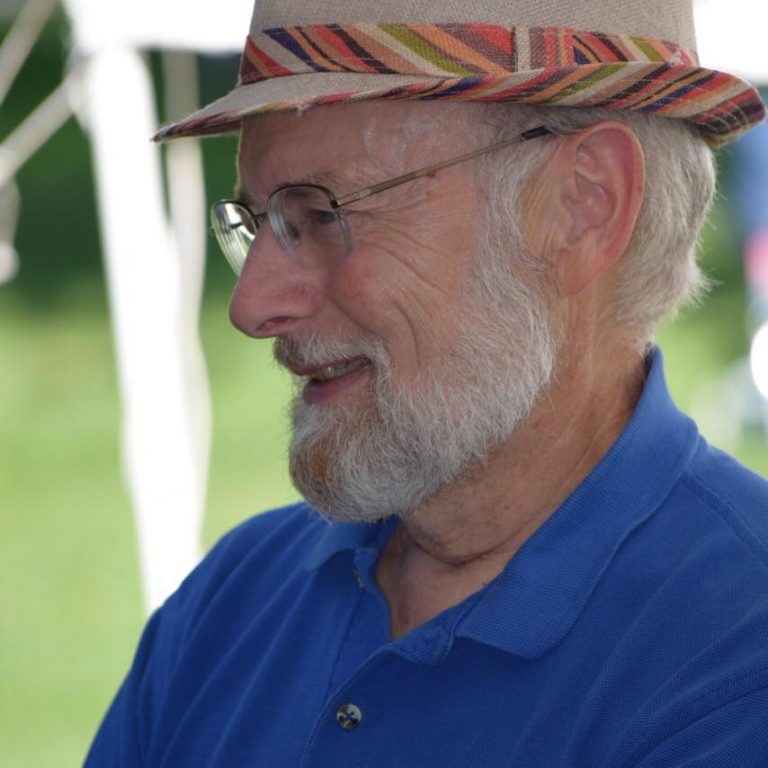It’s not just sending your kid to camp ‐‐ it’s putting them in an environment where they can grow by leaps and bounds as musicians and as human beings and world citizens. ”
“When I compare notes with those who attended other music camps, they all had to audition for every seat, while at Kinhaven seats are rotated, … ” says Chapin Kaynor. “It’s a cooperative endeavor in every regard–you get the parts you can handle, maximizing results and a sense of camaraderie.”

Chapin attended Kinhaven for five years in the 1960s, mostly on French horn but also viola, trombone, and recorder; on the board in the role of recent Kinhaven graduate (’73-’75); and on the activities staff (’74). After leaving Kinhaven, he joined the Vermont Symphony Orchestra, playing French horn there until 1992. He is now a member of the VSO chorus, founded by the late great choral composer and director Robert de Cormier.
Chapin leads a busy life fulfilling his post‐retirement commitments “to do something with kids, do something civic, and do something for seniors.” For the kids, he volunteers in Four Winds science programs, helps with band lessons at the Williston Central School, demos recorders and brass instruments for students considering taking up these instruments, and does some substitute teaching in middle and high school. On the civic front, he is the board chair of Green Mountain Transit, the $20 million, 200‐employee public transportation system that covers the northwest region of state. These things and music making have not yet allowed time for his third retirement goal of driving for Meals on Wheels.
Chapin is also busy when it comes to his first passion, music. In addition to VSO chorus, he is a member of Champlain Consort, which plays Renaissance and Elizabethan music on period instruments, especially recorders and sackbuts (Renaissance trombones). He also plays euphonium in the Green Mountain Brass Band (a British‐style brass band) and in the Williston town band, which he also conducts on occasion.
Chapin stays in touch with several Kinhavenites, including Priscilla Douglas (trumpet faculty ’75 ‐’76), Peter Reit (Horn ’74‐’75), Nate Reit (Tuba ’97‐’00, Trombone ’02‐’05, Staff ’06‐’14), Laura Markowitz (violin faculty ’85‐’86), and Miriam French (violin ’60‐’62). “We share a common bond and a common experience,” he says, remarking on the miraculous combination of rigorous quality and non‐competitiveness that Kinhaven fosters.
In addition to his years as a Kinhaven student and staff, Chapin spent his senior year in high school and freshman year at college at Kinhaven during the off-season working for Mr. Dushkin on buildings and grounds. Chapin recalls that Dushkin manufactured recorders in the barn and kept all the machinery there through the 1960s. “Dushkin developed a unique design where the fipple could be pulled apart. He lined it with ivory and you could slide it apart to clean. I played in many ensembles that included recorder and loved using his recorders. They were very loud ‐‐ great solo instruments.”
Chapin continues to be an enthusiastic Kinhaven supporter, because “it’s an incredible experience for the students. It’s not just sending your kid to camp ‐‐ it’s putting them in an environment where they can grow by leaps and bounds as musicians and as human beings and world citizens.”

As an example of Kinhaven’s influence beyond its borders, Chapin codirected a camp in the early 1980s in Poultney Vermont, modeled on Kinhaven, and some of those campers have gone on to be professional musicians. And in 1987, he participated in establishing a music camp in Honduras sponsored by the Vermont Symphony Orchestra through the Partners in the Americas organization. “This was a big deal, because Honduras was very divided at the time,” he says. The camp used a forestry school campus in the central part of the country to get the students from competing regions together, and the students played unifying concerts in churches around the country. Chapin says, “My vision in these camps was to carry on the traditions I learned at Kinhaven.”

